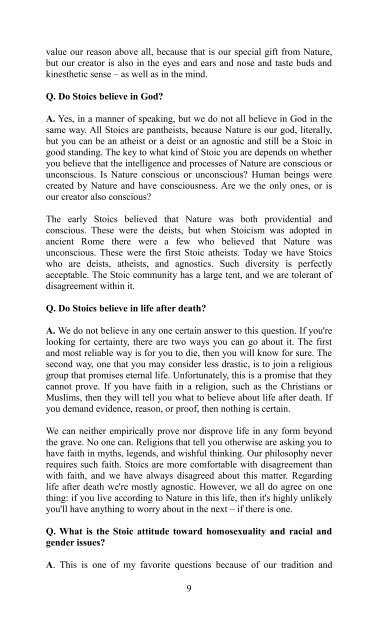The Stoic HANDBOOK - College of Stoic Philosophers
The Stoic HANDBOOK - College of Stoic Philosophers
The Stoic HANDBOOK - College of Stoic Philosophers
You also want an ePaper? Increase the reach of your titles
YUMPU automatically turns print PDFs into web optimized ePapers that Google loves.
value our reason above all, because that is our special gift from Nature,<br />
but our creator is also in the eyes and ears and nose and taste buds and<br />
kinesthetic sense – as well as in the mind.<br />
Q. Do <strong>Stoic</strong>s believe in God?<br />
A. Yes, in a manner <strong>of</strong> speaking, but we do not all believe in God in the<br />
same way. All <strong>Stoic</strong>s are pantheists, because Nature is our god, literally,<br />
but you can be an atheist or a deist or an agnostic and still be a <strong>Stoic</strong> in<br />
good standing. <strong>The</strong> key to what kind <strong>of</strong> <strong>Stoic</strong> you are depends on whether<br />
you believe that the intelligence and processes <strong>of</strong> Nature are conscious or<br />
unconscious. Is Nature conscious or unconscious? Human beings were<br />
created by Nature and have consciousness. Are we the only ones, or is<br />
our creator also conscious?<br />
<strong>The</strong> early <strong>Stoic</strong>s believed that Nature was both providential and<br />
conscious. <strong>The</strong>se were the deists, but when <strong>Stoic</strong>ism was adopted in<br />
ancient Rome there were a few who believed that Nature was<br />
unconscious. <strong>The</strong>se were the first <strong>Stoic</strong> atheists. Today we have <strong>Stoic</strong>s<br />
who are deists, atheists, and agnostics. Such diversity is perfectly<br />
acceptable. <strong>The</strong> <strong>Stoic</strong> community has a large tent, and we are tolerant <strong>of</strong><br />
disagreement within it.<br />
Q. Do <strong>Stoic</strong>s believe in life after death?<br />
A. We do not believe in any one certain answer to this question. If you're<br />
looking for certainty, there are two ways you can go about it. <strong>The</strong> first<br />
and most reliable way is for you to die, then you will know for sure. <strong>The</strong><br />
second way, one that you may consider less drastic, is to join a religious<br />
group that promises eternal life. Unfortunately, this is a promise that they<br />
cannot prove. If you have faith in a religion, such as the Christians or<br />
Muslims, then they will tell you what to believe about life after death. If<br />
you demand evidence, reason, or pro<strong>of</strong>, then nothing is certain.<br />
We can neither empirically prove nor disprove life in any form beyond<br />
the grave. No one can. Religions that tell you otherwise are asking you to<br />
have faith in myths, legends, and wishful thinking. Our philosophy never<br />
requires such faith. <strong>Stoic</strong>s are more comfortable with disagreement than<br />
with faith, and we have always disagreed about this matter. Regarding<br />
life after death we're mostly agnostic. However, we all do agree on one<br />
thing: if you live according to Nature in this life, then it's highly unlikely<br />
you'll have anything to worry about in the next – if there is one.<br />
Q. What is the <strong>Stoic</strong> attitude toward homosexuality and racial and<br />
gender issues?<br />
A. This is one <strong>of</strong> my favorite questions because <strong>of</strong> our tradition and<br />
9

















